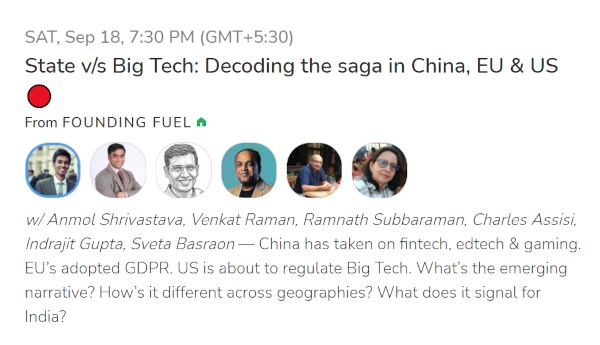[Image by Gerd Altmann from Pixabay]
Good morning and a happy Ganesh Chaturthi! We wish that you get to eat a lot of laddoos.
Like most people, we are watching with much interest how events in the neighbourhood are unfolding now that Afghanistan is under Taliban’s control and is backed by Pakistan’s ISI. How ought the developments as they unfold be viewed by those in India? That is why we re-opened a book that contains a selection of interviews with former Singapore premier Lee Kuan Yew. The Grandmaster’s Insights on China, the United States, and the World, first published in 2013 by MIT Press, continues to stay relevant.
“To stop the increase in terrorist recruits, the US and Europe must discredit extremist ideology, which takes Qu’ranic passages out of context, preaches hatred against non-Muslims, and seeks to spread Islam through violence. Muslims who want to be a part of the modern world of science and technology must confront and stop these Islamists from preaching violence and hatred. They must get the Muslim scholars and religious teachers to preach that Islam is a religion of peace, not terror, and that it is tolerant of other peoples and their faiths… In countries where Muslims are a minority, as in Britain, they must take a clear-cut stand against Islamist terrorists… In Muslim countries such as Pakistan and Iraq, Muslims will be forced to confront the Islamists or witness their governments being overthrown and their people dragged back into a feudal past, just as the Taliban did in Afghanistan.
“The United States must be more multilateral in its approach to isolating jihadist groups and rally Europe, Russia, China, India, and all non-Muslim governments to its cause, along with many moderate Muslims. A worldwide coalition is necessary to fight the fires of hatred that the Islamist fanatics are fanning. When moderate Muslim governments, such as those in Indonesia, Malaysia, the Persian Gulf states, Egypt, and Jordan, feel comfortable associating themselves openly with a multilateral coalition against Islamist terrorism, the tide of battle will turn against the extremists…
“We should learn to live with the Pakistan-terror nexus for a long time. My fear is Pakistan may well get worse.”
We now stand at the inflection point he had spoken about many years ago.
Do think about it.
In this issue,
- A deep dive into the State Vs Big Tech
- The education emergency
- The Space Age
Founding Fuel Exclusive: A deep dive into the State Vs Big Tech
By last count, China has 626 billionaires. However, in the last few months the government has been busy showing them their place. The conflict is most pronounced in its regulatory pressures on Big Tech. State Vs Big Tech is in fact a global theme, but each region has its own peculiarities. In the first of this four-part series, G Venkat Raman, Associate Professor, Humanities and Social Sciences at IIM Indore, does a deep dive into China, examining the political, economic and social motivations behind the crackdown on Big Tech.
Examining the political motivations, he writes, “Ever since Xi Jinping’s elevation as the President of the country and the General Secretary of the Party, China has seen a renewed emphasis on the 'Party First' approach. Given that the secondary sector (manufacturing) mainly drove the country’s economy in more than the first two decades of ‘economic modernization’, China’s leadership decided to engineer further advancement of its economy by making China a tech-driven economy. The state-owned enterprises (SOEs) have limited expertise, and therefore state authorities encouraged domestic tech players and promoted them as national champions in the tech domain.
“The state was more than ‘a willing partner’ to the tech startups and negotiated the limits of state-society boundaries, which are otherwise very clear in the non-economic domains. It was also comfortable partnering with the private players to implement domestic and foreign policies. As a result, mobile payment apps like Ali Pay (of Alibaba) and WeChat (of Tencent) became important partners in the BRI (Belt and Road Initiative) markets.
“Once the state built a critical mass, the country’s leadership decided to take a U-turn and timed its swoop on Big Tech to perfection, hurting them when it mattered the most.”
Prof Venkat Raman will also engage in a conversation with Founding Fuel readers on Clubhouse on Saturday, September 18, at 7:30 PM.

Please mark your calendars.
Dig deeper
The education emergency
There is much concern among parents and teachers about how effective online schooling really is. This is a theme Anurag Behar, CEO of the Azim Premji Foundation, has been looking at and Chandra Srikanth of Moneycontrol caught up with him for a perspective.
“Online learning is ineffective because of two reasons. One, most children don’t have access to online learning. And second, the inherent nature of learning of children is such that online learning doesn't work, it's ineffective.
“The second kind of good-intentioned effort has been what is called mohalla classes, which is teachers going into neighbourhoods, into villages and conducting classes, right, again, good-intentioned efforts. But, mohalla classes, which you can conduct a couple of hours a day, cannot substitute for eight hours of school six days a week. So all these efforts have led to basically little or no education for the vast majority of our 240 million children since March 2020. So this is one kind of lost learning, the learning that should have happened from March 2020 to now.
“The second one and any one of us can relate to this. If you have not done something for 17 months. Kids who have not come to school for 17 months have forgotten much of what they knew in March 2020. So that’s the second kind of learning loss.
“Kids have lost foundational abilities. For example, if you show a child a picture, can she narrate the picture in her own words? Or if you talk of arithmetic, can a child recognise two numbers, or can she add three numbers? Those are called foundational abilities. The study suggested that 90% of kids had lost foundational abilities in the language.
“Roughly 80% of kids lost foundational abilities in Mathematics. Good intentioned efforts have happened to engage them in education, but they’re not effective. So children have lost learning for 17 months, and then forgotten much of what they knew. That’s the emergency we face.”
There is much else Behar has to talk about basis his primary research and travels across India.
Dig deeper
The Space Age

(Via WhatsApp)
Found anything interesting and noteworthy? Send it to us and we will share it through this newsletter.
And if you missed previous editions of this newsletter, they’re all archived here.
Bookmark Founding Fuel’s special section on Thriving in Volatile Times. All our stories on how individuals and businesses are responding to the pandemic until now are posted there.
Warm regards,
Team Founding Fuel
(Note: Founding Fuel may earn commissions for purchases made through the Amazon affiliate links in this article.)

